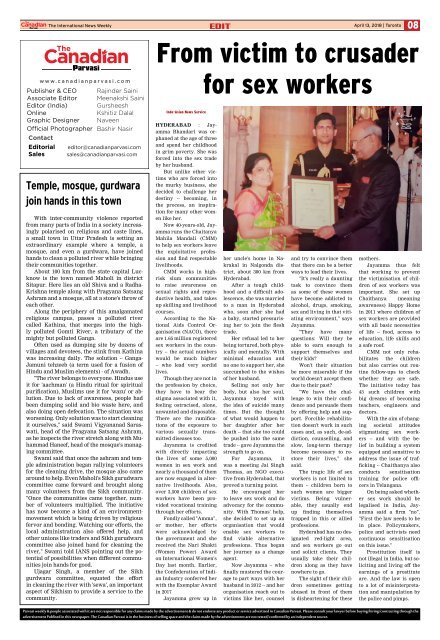You also want an ePaper? Increase the reach of your titles
YUMPU automatically turns print PDFs into web optimized ePapers that Google loves.
The International News Weekly EDIT<br />
08<br />
April 13, 2018 | Toronto<br />
The<br />
w w w . canadianparv asi. c o m<br />
Publisher & CEO<br />
Associate Editor<br />
Editor (India)<br />
Online<br />
Graphic Designer<br />
Official Photographer<br />
Contact<br />
Editorial<br />
Sales<br />
Rajinder Saini<br />
Meenakshi Saini<br />
Gursheesh<br />
Kshitiz Dalal<br />
Naveen<br />
Bashir Nasir<br />
editor@canadianparvasi.com<br />
sales@canadianparvasi.com<br />
Temple, mosque, gurdwara<br />
join hands in this town<br />
With inter-community violence reported<br />
from many parts of India in a society increasingly<br />
polarised on religious and caste lines,<br />
a small town in Uttar Pradesh is setting an<br />
extraordinary example where a temple, a<br />
mosque, and even a gurdwara, have joined<br />
hands to clean a polluted river while bringing<br />
their communities together.<br />
About 100 km from the state capital Lucknow<br />
is the town named Maholi in district<br />
Sitapur. Here lies an old Shiva and a Radha-<br />
Krishna temple along with Pragyana Satsang<br />
Ashram and a mosque, all at a stone's throw of<br />
each other.<br />
Along the periphery of this amalgamated<br />
religious campus, passes a polluted river<br />
called Kathina, that merges into the highly<br />
polluted Gomti River, a tributary of the<br />
mighty but polluted Ganga.<br />
Often used as dumping site by dozens of<br />
villages and devotees, the stink from Kathina<br />
was increasing daily. The solution -- Ganga-<br />
Jamuni tehzeeb (a term used for a fusion of<br />
Hindu and Muslim elements) - of Awadh.<br />
"The river belongs to everyone. Hindus use<br />
it for 'aachman' (a Hindu ritual for spiritual<br />
purification), Muslims use it for 'wazu' or ablution.<br />
Due to lack of awareness, people had<br />
been dumping solid and bio waste here, and<br />
also doing open defecation. The situation was<br />
worsening. Only solution was to start cleaning<br />
it ourselves," said Swami Vigyananad Saraswati,<br />
head of the Pragyana Satsang Ashram,<br />
as he inspects the river stretch along with Muhammad<br />
Haneef, head of the mosque's managing<br />
committee.<br />
Swami said that once the ashram and temple<br />
administration began rallying volunteers<br />
for the cleaning drive, the mosque also came<br />
around to help. Even Maholi's Sikh gurudwara<br />
committee came forward and brought along<br />
many volunteers from the Sikh community.<br />
"Once the communities came together, number<br />
of volunteers multiplied. The initiative<br />
has now become a kind of an environmentmovement<br />
which is being driven by religious<br />
fervor and bonding. Watching our efforts, the<br />
local administration also offered help, and<br />
other unions like traders and Sikh gurudwara<br />
committee also joined hand for cleaning the<br />
river," Swami told IANS pointing out the potential<br />
of possibilities when different communities<br />
join hands for good.<br />
Ujagar Singh, a member of the Sikh<br />
gurdwara committee, equated the effort<br />
in cleaning the river with 'sewa', an important<br />
aspect of Sikhism to provide a service to the<br />
community.<br />
From victim to crusader<br />
for sex workers<br />
Indo-Asian News Service<br />
Hyderabad : Jayamma<br />
Bhandari was orphaned<br />
at the age of three<br />
and spend her childhood<br />
in grim poverty. She was<br />
forced into the sex trade<br />
by her husband.<br />
But unlike other victims<br />
who are forced into<br />
the murky business, she<br />
decided to challenge her<br />
destiny -- becoming, in<br />
the process, an inspiration<br />
for many other women<br />
like her.<br />
Now 40-years-old, Jayamma<br />
runs the Chaitanya<br />
Mahila Mandali (CMM)<br />
to help sex workers leave<br />
the exploitative profession<br />
and find respectable<br />
livelihoods.<br />
CMM works in highrisk<br />
slum communities<br />
to raise awareness on<br />
sexual rights and reproductive<br />
health, and takes<br />
up skilling and livelihood<br />
courses.<br />
According to the National<br />
Aids Control Organisation<br />
(NACO), there<br />
are 1.65 million registered<br />
sex workers in the country<br />
-- the actual numbers<br />
would be much higher<br />
-- who lead very sordid<br />
lives.<br />
Though they are not in<br />
the profession by choice,<br />
they have to bear the<br />
stigma associated with it,<br />
feeling ostracised, alone,<br />
unwanted and disposable.<br />
There are the ramifications<br />
of the exposure to<br />
various sexually transmitted<br />
diseases too.<br />
Jayamma is credited<br />
with directly impacting<br />
the lives of some 5,000<br />
women in sex work and<br />
nearly a thousand of them<br />
are now engaged in alternative<br />
livelihoods. Also,<br />
over 3,500 children of sex<br />
workers have been provided<br />
vocational training<br />
through her efforts.<br />
Fondly called "Amma",<br />
or mother, her efforts<br />
were acknowledged by<br />
the government and she<br />
received the Nari Shakti<br />
(Women Power) Award<br />
on International Women's<br />
Day last month. Earlier,<br />
the Confederation of Indian<br />
Industry conferred her<br />
with the Exemplar Award<br />
in 2017<br />
Jayamma grew up in<br />
her uncle's home in Nakrakal<br />
in Nalgonda district,<br />
about 300 km from<br />
Hyderabad.<br />
After a tough childhood<br />
and a difficult adolescence,<br />
she was married<br />
to a man in Hyderabad<br />
who, soon after she had<br />
a baby, started pressurising<br />
her to join the flesh<br />
trade.<br />
Her refusal led to her<br />
being tortured, both physically<br />
and mentally. With<br />
minimal education and<br />
no one to support her, she<br />
succumbed to the wishes<br />
of her husband.<br />
Selling not only her<br />
body, but also her soul,<br />
Jayamma toyed with<br />
the idea of suicide many<br />
times. But the thought<br />
of what would happen to<br />
her daughter after her<br />
death -- that she too could<br />
be pushed into the same<br />
trade -- gave Jayamma the<br />
strength to go on.<br />
For Jayamma, it<br />
was a meeting Jai Singh<br />
Thomas, an NGO executive<br />
from Hyderabad, that<br />
proved a turning point.<br />
He encouraged her<br />
to leave sex work and do<br />
advocacy for the community.<br />
With Thomas' help,<br />
she decided to set up an<br />
organisation that would<br />
enable sex workers to<br />
find viable alternative<br />
professions. Thus began<br />
her journey as a change<br />
agent.<br />
Now Jayamma -- who<br />
finally mustered the courage<br />
to part ways with her<br />
husband in 2012 -- and her<br />
organisation reach out to<br />
victims like her, counsel<br />
and try to convince them<br />
that there can be a better<br />
ways to lead their lives.<br />
"It's really a daunting<br />
task to convince them<br />
as some of these women<br />
have become addicted to<br />
alcohol, drugs, smoking,<br />
sex and living in that vitiating<br />
environment," says<br />
Jayamma.<br />
"They have many<br />
questions: Will they be<br />
able to earn enough to<br />
support themselves and<br />
their kids?<br />
Won't their situation<br />
be more miserable if the<br />
world doesn't accept them<br />
due to their past?<br />
"We have the challenge<br />
to win their confidence<br />
and persuade them<br />
by offering help and support.<br />
Forcible rehabilitation<br />
doesn't work in such<br />
cases and, as such, de-addiction,<br />
counselling, and<br />
slow, long-term therapy<br />
become necessary to restore<br />
their lives," she<br />
said.<br />
The tragic life of sex<br />
workers is not limited to<br />
them -- children born to<br />
such women are bigger<br />
victims. Being vulnerable,<br />
they usually end<br />
up finding themselves<br />
trapped in this or allied<br />
professions.<br />
Hyderabad has no designated<br />
red-light area,<br />
and sex workers go out<br />
and solicit clients. They<br />
usually take their children<br />
along as they have<br />
nowhere to go.<br />
The sight of their children<br />
sometimes getting<br />
abused in front of them<br />
is disheartening for these<br />
mothers.<br />
Jayamma thus felt<br />
that working to prevent<br />
the victimisation of children<br />
of sex workers was<br />
important. She set up<br />
Chaithanya (meaning<br />
awareness) Happy Home<br />
in 2011 where children of<br />
sex workers are provided<br />
with all basic necessities<br />
of life -- food, access to<br />
education, life skills and<br />
a safe roof.<br />
CMM not only rehabilitates<br />
the children<br />
but also carries out routine<br />
follow-ups to check<br />
whether they are safe.<br />
The initiative today has<br />
43 such children with<br />
big dreams of becoming<br />
teachers, engineers and<br />
doctors.<br />
With the aim of changing<br />
societal attitudes<br />
stigmatising sex workers<br />
-- and with the belief<br />
in building a system<br />
equipped and sensitive to<br />
address the issue of trafficking<br />
-- Chaithanya also<br />
conducts sensitisation<br />
training for police officers<br />
in Telangana.<br />
On being asked whether<br />
sex work should be<br />
legalised in India, Jayamma<br />
said a firm "no".<br />
"First the law needs to be<br />
in place. Policymakers,<br />
police and activists need<br />
continuous sensitisation<br />
on this issue."<br />
Prostitution itself is<br />
not illegal in India, but soliciting<br />
and living off the<br />
earnings of a prostitute<br />
are. And the law is open<br />
to a lot of misinterpretation<br />
and manipulation by<br />
the police and pimps.<br />
Parvasi weekly & people associated with it are not responsible for any claims made by the advertisement & do not endorse any product or service advertised in Canadian Parvasi. Please consult your lawyer before buying/hiring/contracting through the<br />
advertisement Publised in this newspaper. The Canadian Parvasi is in the business of selling space and the clains made by the advertisement are not tested/confirmed by an independent source.

















